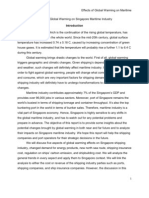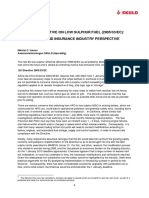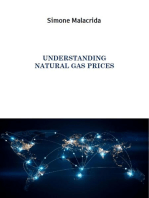Cleaning Up Bunker Fuels. But at What Cost?: January 2010
Cleaning Up Bunker Fuels. But at What Cost?: January 2010
Uploaded by
api-25890976Copyright:
Available Formats
Cleaning Up Bunker Fuels. But at What Cost?: January 2010
Cleaning Up Bunker Fuels. But at What Cost?: January 2010
Uploaded by
api-25890976Original Title
Copyright
Available Formats
Share this document
Did you find this document useful?
Is this content inappropriate?
Copyright:
Available Formats
Cleaning Up Bunker Fuels. But at What Cost?: January 2010
Cleaning Up Bunker Fuels. But at What Cost?: January 2010
Uploaded by
api-25890976Copyright:
Available Formats
S P E C I A L R E P O R T
SHIPPING
Cleaning Up Bunker Fuels.
But at What Cost?
January 2010
By
William Bathurst
Managing Editor, Platts Marine Alert
and
Ellie Weir
Editor, Platts Bunkers
S PEC I AL RE PO R T: S H I P P I N G
introduction in force of European legalisation governing the use of 0.1%
sulfur fuels in ports and on inland waterways.
As Environmental pressure grows on the oil industry due
to their role in carbon emissions, so the shipping industry, After January 1 2010, all ships berthed in EU ports for more
which was exempt from the Kyoto protocol on cutting carbon than two hours are required to burn fuel of less than 0.1%
emissions, has come under increasing scrutiny to catch up sulfur and the sale of MGO with a sulfur content of more than
with other more strictly regulated industries. 0.1% was banned in EU member states.
Airlines have responded to this pressure and promised to Those vessels connected to shore power whilst alongside
cut annual carbon dioxide emissions of 650 million tonnes by (known as cold-ironing) are exempted. When cold ironing ships
50% by 2050. That amount of emitted greenhouse gas is half in berth switch to shore-side electricity in ports, and cut the
that produced by the global shipping industry so the need for need for burning MGO in port. This swap both cuts fuel costs
emissions and sulfur limiting legislation is evident within the for ships and also brings the promise of tax breaks from the EU
marine industry. as it would cut emissions significantly.
What is still unclear is how an industry, that has been
massively hit by the global economic slowdown, will cope with Implications of the legislation
the costs associated with cleaner and thus more expensive
Firstly, the most pressing implication for those in the industry is
fuels. This report will focus on the new legislation coming
the higher price associated with the switch to cleaner fuels as
into force in the shipping industry throughout 2010, and then
they are of course more expensive to produce.
analyse the implications of this legislation.
The largest cost for an operator is their bunker costs. When
MARPOL legislation bunkers are $200/mt, ships will move at higher speeds but
when prices double and ship values are halved or worse, ships
The legislation that comes into force in 2010 was drafted will steam at economical speeds to burn less bunkers saving
in October 2008 to revise Annex VI of 1978 International out of pocket expenses.
Convention for the Prevention of Pollution from Ships.
If a ship that can do 18 knots on 33 mt of intermediate bunker
The main changes to MARPOL Annex VI will see a progressive fuel per day slows to 15 knots, they will burn only 25 mt/day and
reduction in sulfur oxide (SOx) emissions from ships, with the will also take 20% longer to get to where the ship is going.
global sulfur cap reduced initially to 3.5% from the current 4.5%
from 1 January 2012 and then progressively lowered further Consequently if the ship saves 8 mt a day with bunkers at $400/
to 0.5 %, from 1 January 2020. This is however subject to a mt they save $3,200/day so with a time-charter value of a ship
feasibility review to be completed no later than 2018 and many at $20,000/day, 20% of that is $4,000/day meaning it would not
in the shipping industry already believe the target to be too pay to slow-steam.
ambitious.
However, if the time-charter value of the ship was $10,000/
This reduction however pales into insignificance in comparison day, then the extra time would cost $2,000/day and the bunker
to the sulfur limits applicable in Sulfur Emission Control Areas costs they saved would still be $3,200/day, meaning $1,200/day
(SECAs) which will be reduced to 1% from July 1 2010 (from savings. Then it does pay to slow-steam.
the current 1.5 %) and then further reduced to 0.1 %, effective
The practice has been in use for over a year on several tanker
January 1, 2015.
routes already but the global economic slowdown combined
Progressive reductions in nitrogen oxide (NOx) emissions from with over-ordering particularly in the tanker markets has
marine engines have also been agreed, with the most stringent caused a tonnage demand/supply imbalance. When tankers
controls on so-called “Tier III” engines or those installed on take longer to complete their journeys they are out of the spot
ships constructed on or after 1 January 2016 and operating in market for longer, which can help lend some support to the
Emission Control Areas. market.
The revised Annex VI will allow for an Emission Control Area In the tanker spot market however, it is the charterers’ decision
to be designated for SOx and particulate matter, or NOx, or all to allow slow-steaming and owners must seek their approval
three types of emissions from ships, subject to a proposal from for this to take place. Nevertheless, slow-steaming had been
a party or parties to the Annex, which would be considered for cited by tanker sources as providing an ongoing relief from the
adoption by MARPOL, if supported by a demonstrated need to overcapacity in the market.
prevent, reduce and control one or all three of those emissions
With ever cleaner fuels increasingly costing high amounts,
from ships.
the practice of slow steaming will become more and more
Alongside the MARPOL legislation, the EU has also been prevalent, sources in the tanker market believe particularly if
taking steps to limit sulfur in its member states’ seas, before the low sulphur premiums seen in the past re-emerge once the
the MARPOL legislation comes into force. The first test of this global economies pick up.
tightening environmental legislation has been the recent entry
2 | Cleaning Up Bunker Fuels. But at What Cost?
The below graph shows the premium for low sulphur 1.5% 380 “As vessels have to use gasoil 0.1% in port from the new year
CST bunker over High sulphur 380 in the port of Rotterdam over and many vessels are starting to run on gasoil [so there’s] not
the last two years. This peaked at $100/mt in 2008 although was a lot of demand, one has to stop buying and the sellers are
typically around $35-40/mt that year. A slow down in demand in stopping to put it on the market and so we have had to get rid
2009 brought that back down to $15-20/mt. of our dmb barges,” one trading source in Rotterdam said.
The greater expense is not of course restricted to marine fuel However while many traders and suppliers saw the buying
oil with lower sulphur distillates also being stronger. Platts patterns for distillates shift well in advance of the EU
began assessments of marine gasoil in the same port at the legislation, changes to storage had not been so successfully
beginning of this year and the current premium over marine migrated.
diesel oil shows that the cost to shippers of the switch to the
former was fuel was a premium of $20-40/mt. This of course “We have enough barges for MGO but tank storage is tight for
varies according to market conditions and in spite of tankers the moment in all parts of Hamburg, so we will see what comes
storing huge quantities of gasoil off the coasts of Europe. up in the next few weeks and months. We need storage tanks
Admittedly however, this gasoil needs to be blended to marine and this will be a problem, because for now we have a lot of
specifications. tanks for fuel or MDO but not for MGO. So we have to clean
tanks etc, [and to] clean a tank etc. costs a lot of money,” a
Another implication, with particular regard to the January source in Hamburg commented.
legislation is enforcement. The legislation itself states that fuel
changeovers must be recorded in ships’ logbooks a process As the new legislation comes into force and sulfur levels
which many sources have questioned and only time will tell are cut further and further, the bunker industry and ship
how this method of self regulation is successful. owners are already looking at their options to meet the new
requirements. However the biggest concern is what the
As EU ports have realized that ships distillate use will move increased pricing will do to the balance sheets of an industry
entirely from marine diesel oil to marine gasoil due to the sulfur already suffering from the global economic downturn and in
cap, they saw demand for diesel fall away from the middle of many sectors a heavy order-book.
2009.
The price of ship fuel is going to become and an ever more
Although some traders feel that the better supplied gasoil important consideration.
market may actually lead to prices for gasoil coming down.
“More demand will gain influence of the price, but I do not
think the prices will go massively up, because on the MGO side
we have a lot more [supply] competition,” one trader said.
Low Sulfur 380 CST Premium in the Port of Rotterdam (USD/MT)
Source: Platts
Cleaning Up Bunker Fuels. But at What Cost? | 3
About Platts
Platts, a division of The McGraw-Hill Companies (NYSE: MHP), is the market leader for independent
real-time news, pricing, and data for the energy and metals markets. From our 17 worldwide offices,
we create market transparency and drive better decision-making for traders and investors in more
than 150 countries. More information is available at www.platts.com.
For more information, please contact the Platts sales office nearest you.
North America EMEA Latin America Asia-Pacific Russia www.platts.com
+1-800-PLATTS8 (toll-free) +44-(0)20-7176-6111 +54-11-4804-1890 +65-6530-6430 +7-495-783-4141 support@platts.com
+1-212-904-3070 (direct)
© 2010 Platts, a Division of The McGraw-Hill Companies, Inc.
Reproduction of this publication in any form is prohibited except with the written permission of Platts. Because of the possibility of human or mechanical error
by Platts’ sources, Platts does not guarantee the accuracy, adequacy, completeness, or availability of any Platts information and is not responsible for any
errors or omissions or for the use of such Platts information. Platts gives no express or implied warranties, including, but not limited to, any implied warranties of
merchantability or fitness for a particular purpose or use. In no event shall Platts be liable for any direct, indirect, special, or consequential damages in connection
with subscribers’ or others’ use of this publication.
You might also like
- Effects of Global Warming On Singapore Maritime IndustryDocument14 pagesEffects of Global Warming On Singapore Maritime IndustrySylviaLiu100% (1)
- Borehole Completion FormDocument3 pagesBorehole Completion FormRICHARD0% (1)
- Sulphur Content in Ships Bunker Fuel 2015Document38 pagesSulphur Content in Ships Bunker Fuel 2015jirafabg123No ratings yet
- 2020 IMO Fuel Sulphur RegulationDocument7 pages2020 IMO Fuel Sulphur Regulationlucas100% (1)
- Group-4 SSC SBR-1Document6 pagesGroup-4 SSC SBR-1Kaushil GarodiaNo ratings yet
- 05-Is Slow Steaming A Sustainable Means of Reducing CO2 EmissionsDocument5 pages05-Is Slow Steaming A Sustainable Means of Reducing CO2 Emissionsrahmdel.mohsen1132No ratings yet
- Consultation Comments Table - Impact Assessment 8 December 2014Document21 pagesConsultation Comments Table - Impact Assessment 8 December 2014hpss77No ratings yet
- DWI BunDocument18 pagesDWI Bungalin8575No ratings yet
- Economic Assessment of LNG Bunkering in The Portuguese Coast and Atlantic IslandsDocument10 pagesEconomic Assessment of LNG Bunkering in The Portuguese Coast and Atlantic IslandsRadu GodinaNo ratings yet
- 2010-14 amsa mngDocument2 pages2010-14 amsa mngNIKOLAOS SPANOLIOSNo ratings yet
- Is Slow Steaming A Sustainable Mean For Reducing Liner Shipping CO Emissions?Document15 pagesIs Slow Steaming A Sustainable Mean For Reducing Liner Shipping CO Emissions?ShrinivasNo ratings yet
- Marine Gas Engine Marine Gas EngineDocument6 pagesMarine Gas Engine Marine Gas Enginedeminta.akbarNo ratings yet
- The Impact of Low Sulphur Fuel Requirements in Shipping On The Competitiveness of Roro Shipping in Northern EuropeDocument33 pagesThe Impact of Low Sulphur Fuel Requirements in Shipping On The Competitiveness of Roro Shipping in Northern EuropeosmanyukseNo ratings yet
- Shipping, World Trade and The Reduction ofDocument6 pagesShipping, World Trade and The Reduction ofpresentation555No ratings yet
- Electives Lesson 4Document26 pagesElectives Lesson 4Mixed VideosNo ratings yet
- DNV - Shipping 2020 (Report) (2012)Document68 pagesDNV - Shipping 2020 (Report) (2012)Sofia KentNo ratings yet
- Will Spiking Cost of Fuel Cause You Pain?: Imo-2020 Is Coming To TownDocument18 pagesWill Spiking Cost of Fuel Cause You Pain?: Imo-2020 Is Coming To TownaryanNo ratings yet
- Developing LNG Bunkering in IndiaDocument17 pagesDeveloping LNG Bunkering in IndiaMaria NirmalNo ratings yet
- Developing LNG Bunkering in IndiaDocument17 pagesDeveloping LNG Bunkering in IndiaAnanya AtluriNo ratings yet
- 2.TRD626-AnnotedDocument6 pages2.TRD626-Annoted1120284785No ratings yet
- Low Sulphur FuelDocument7 pagesLow Sulphur Fuelgokulganapathy24No ratings yet
- Operation On Low-Sulphur FuelsDocument14 pagesOperation On Low-Sulphur Fuelsgiannis2No ratings yet
- ImplicationsofnewRegulationbaltic MgolDocument34 pagesImplicationsofnewRegulationbaltic MgolThomas BranleyNo ratings yet
- Curent EventDocument2 pagesCurent Eventapi-487853215No ratings yet
- ABS - Fuel Switching Advisory NoticeDocument36 pagesABS - Fuel Switching Advisory NoticeHugo SchuitemakerNo ratings yet
- Essay On Marpol Final1500 WordDocument5 pagesEssay On Marpol Final1500 WordCHEM PEACENo ratings yet
- Applsci 11 02050 v2Document15 pagesApplsci 11 02050 v2Achmad MustakimNo ratings yet
- Working Paper - 2015 Sulphur Impact - 5.14. 13Document30 pagesWorking Paper - 2015 Sulphur Impact - 5.14. 13Naresh SharmaNo ratings yet
- Sulphur 2020Document11 pagesSulphur 2020Yasir Arafin TonmoyNo ratings yet
- Safety at Sea-Legal BackgroundDocument4 pagesSafety at Sea-Legal BackgroundLuciana cNo ratings yet
- Marpol 2020Document15 pagesMarpol 2020shantisagarkoneruNo ratings yet
- Operation On Low Sulphur FuelsDocument24 pagesOperation On Low Sulphur FuelsAlejandro Jose Malave RamosNo ratings yet
- Practical Steps Toward A Carbon-Free Maritime Industry: Updates On Fuels, Ports, and TechnologyDocument7 pagesPractical Steps Toward A Carbon-Free Maritime Industry: Updates On Fuels, Ports, and TechnologyThe International Council on Clean TransportationNo ratings yet
- PRO-white-paper-will Alternative Fuels Be Available To Meet Marine Decarbonisation TargetsDocument12 pagesPRO-white-paper-will Alternative Fuels Be Available To Meet Marine Decarbonisation TargetsmiguelchirinosNo ratings yet
- Speed Limits Versus Slow SteamingDocument10 pagesSpeed Limits Versus Slow Steamingc rkNo ratings yet
- Shore To Ship System - An Alternative Electric PowDocument11 pagesShore To Ship System - An Alternative Electric PowJCANo ratings yet
- ECA Compliance EbookDocument62 pagesECA Compliance Ebookbuzbon100% (1)
- Anti-Piracy Solutions: Serious Products For A Serious ProblemDocument44 pagesAnti-Piracy Solutions: Serious Products For A Serious ProblemAybars OrucNo ratings yet
- Introduction and SummaryDocument6 pagesIntroduction and SummaryManoj TyagiNo ratings yet
- Reducing Sulphur in Marine FuelsDocument3 pagesReducing Sulphur in Marine FuelsCHRISTOS KALOUDISNo ratings yet
- Low SulphurDocument55 pagesLow SulphurАлександр РусскихNo ratings yet
- Air Pollution From ShipsDocument7 pagesAir Pollution From ShipsKhairul AzaniNo ratings yet
- EU Low Sulphur DirectiveDocument6 pagesEU Low Sulphur DirectiverpNo ratings yet
- 7 April All NewsDocument14 pages7 April All NewsAzlan KhanNo ratings yet
- Marpol 73Document3 pagesMarpol 73Arie AozNo ratings yet
- WHITE PAPER - Green TechnologyDocument13 pagesWHITE PAPER - Green Technologyccs sandeepNo ratings yet
- MARPOL 73/78: The International Convention For The Prevention of Pollution From ShipsDocument9 pagesMARPOL 73/78: The International Convention For The Prevention of Pollution From ShipsSANDI KARONo ratings yet
- A Comparative Life Cycle Assessment of Marine Fuels: Liquefied Natural Gas and Three Other Fossil FuelsDocument14 pagesA Comparative Life Cycle Assessment of Marine Fuels: Liquefied Natural Gas and Three Other Fossil FuelsHilalnur BoyracıNo ratings yet
- WHOC09 302 PaperDocument11 pagesWHOC09 302 PaperEngelbert MorenoNo ratings yet
- Annex VI and SustainabilityDocument7 pagesAnnex VI and Sustainabilitydmml845No ratings yet
- Open Loop-1-2Document2 pagesOpen Loop-1-2galin8575No ratings yet
- IMO Marine Environmental Protection Committee - March 2010 - tcm155-193338Document4 pagesIMO Marine Environmental Protection Committee - March 2010 - tcm155-193338Nick GounarisNo ratings yet
- IMO Sulphur Reduction 2013Document3 pagesIMO Sulphur Reduction 2013TermiteEnkayNo ratings yet
- BMTDSL Aegir Conpaper Pacific Jan06Document10 pagesBMTDSL Aegir Conpaper Pacific Jan06DUNCAN0420No ratings yet
- IMO Guidelines For Sulphur CapDocument4 pagesIMO Guidelines For Sulphur CapVarunNo ratings yet
- Carbon Capture and Storage: The Legal Landscape of Climate Change Mitigation TechnologyFrom EverandCarbon Capture and Storage: The Legal Landscape of Climate Change Mitigation TechnologyNo ratings yet
- From Big Oil to Big Green: Holding the Oil Industry to Account for the Climate CrisisFrom EverandFrom Big Oil to Big Green: Holding the Oil Industry to Account for the Climate CrisisNo ratings yet
- She's cosy welcoming She's entertaining She's a floating bombFrom EverandShe's cosy welcoming She's entertaining She's a floating bombNo ratings yet
- Strategy For The Current Market Environment: Intuition Investment ReportDocument3 pagesStrategy For The Current Market Environment: Intuition Investment Reportapi-25890976No ratings yet
- Submission - National Mediator Accreditation SchemeDocument6 pagesSubmission - National Mediator Accreditation Schemeapi-25890976No ratings yet
- Agreement Between The Government of The United States of America and The Government of Gibraltar For The Exchange of Information Relating To TaxesDocument8 pagesAgreement Between The Government of The United States of America and The Government of Gibraltar For The Exchange of Information Relating To Taxesapi-25890976No ratings yet
- ADR Bulletin: Developing Understanding in ConflictDocument5 pagesADR Bulletin: Developing Understanding in Conflictapi-25890976No ratings yet
- McKinsey On PaymentsDocument8 pagesMcKinsey On Paymentsapi-25890976No ratings yet
- Winter Law School ProgrammeDocument1 pageWinter Law School Programmeinvestorseurope offshore stockbrokersNo ratings yet
- Titanium Resources Group Preliminary ResultsDocument19 pagesTitanium Resources Group Preliminary Resultsapi-25890976No ratings yet
- Understanding The Biggest Market in The WorldDocument5 pagesUnderstanding The Biggest Market in The Worldapi-25890976No ratings yet
- A Consumer's Guide To MiFIDDocument13 pagesA Consumer's Guide To MiFIDapi-25890976No ratings yet
- Metals & Minerals October 7, 2009Document53 pagesMetals & Minerals October 7, 2009api-25890976No ratings yet
- Risk Assessment ReportDocument41 pagesRisk Assessment Reportapi-25890976100% (1)
- South Luangwa Conservation SocietyDocument29 pagesSouth Luangwa Conservation Societyapi-25890976No ratings yet
- BMO CM Basic Points Nov 2009Document43 pagesBMO CM Basic Points Nov 2009ZerohedgeNo ratings yet
- South Luangwa Conservation SocietyDocument29 pagesSouth Luangwa Conservation Societyapi-25890976No ratings yet
- RapporteurDocument6 pagesRapporteurapi-25890976No ratings yet
- No. London Summit / Washington Action Plan Text ProgressDocument23 pagesNo. London Summit / Washington Action Plan Text Progressapi-25890976No ratings yet
- Mauritius Kestrel: Eastern Subpopulation 2008/09 Breeding Season ReportDocument47 pagesMauritius Kestrel: Eastern Subpopulation 2008/09 Breeding Season Reportapi-25890976No ratings yet
- T H e 7 N A T I o N A L M e D I A T I o N C o N F e R e N C eDocument25 pagesT H e 7 N A T I o N A L M e D I A T I o N C o N F e R e N C eapi-25890976No ratings yet
- Pfizer Inc Sponsors 7th Biennial U.S.-Africa Business SummitDocument1 pagePfizer Inc Sponsors 7th Biennial U.S.-Africa Business Summitapi-25890976No ratings yet
- Protective Equipment (P.P.E) : Gashubin Eng Pte LTDDocument11 pagesProtective Equipment (P.P.E) : Gashubin Eng Pte LTDMd ShahinNo ratings yet
- Marine 2000 M91 535102277 - ENDocument359 pagesMarine 2000 M91 535102277 - ENAhmad Abdulah HasaniNo ratings yet
- Feasibility Analysis of Establishing Charging Stations For Electric CarsDocument82 pagesFeasibility Analysis of Establishing Charging Stations For Electric CarsEdibel Marianny Calderòn PireNo ratings yet
- Three Phase MotorDocument2 pagesThree Phase MotorAnamika TiwaryNo ratings yet
- 2015-10-23 Heat Evolution Fahim01 PDFDocument24 pages2015-10-23 Heat Evolution Fahim01 PDFSK Abdul KaiumNo ratings yet
- Technical Standard For SolarDocument44 pagesTechnical Standard For SolarAbhinav SinhaNo ratings yet
- FGD New MagnesiumDocument12 pagesFGD New MagnesiumdracensfelNo ratings yet
- Muheimmeid Seijid Seieed +44 141 4161015 Emeiil: Skype ID: ToseijidseieedDocument18 pagesMuheimmeid Seijid Seieed +44 141 4161015 Emeiil: Skype ID: ToseijidseieedVarun SNo ratings yet
- Heat Transfer Midterm To Final ReviewDocument4 pagesHeat Transfer Midterm To Final ReviewkolNo ratings yet
- Catalogue-2019 ENDocument32 pagesCatalogue-2019 ENpcatruongNo ratings yet
- Part AC DH SatuiDocument1 pagePart AC DH SatuiEdison PondaNo ratings yet
- Generator WebcastDocument41 pagesGenerator WebcastkrcdewanewNo ratings yet
- Reinforced Aluminum PDFDocument5 pagesReinforced Aluminum PDFsmani170No ratings yet
- Ongc Growth StrategyDocument10 pagesOngc Growth StrategydhavalmevadaNo ratings yet
- Severn EST ScrubberDocument4 pagesSevern EST ScrubberYusak Santoso UseNo ratings yet
- PresentationDocument38 pagesPresentationAnonymous C09uQydeB100% (1)
- H V P, I .: Y AC Roducts NCDocument3 pagesH V P, I .: Y AC Roducts NCganeshNo ratings yet
- Briquettes: Bioenergy and Food Security Rapid Appraisal (Befs Ra) User ManualDocument44 pagesBriquettes: Bioenergy and Food Security Rapid Appraisal (Befs Ra) User ManualgoutamsasmitaNo ratings yet
- Jme Crawler PDFDocument2 pagesJme Crawler PDFrezokaNo ratings yet
- Recovery Boiler Air Systems - Rick Wessel, PH.DDocument16 pagesRecovery Boiler Air Systems - Rick Wessel, PH.Dsony setyawanNo ratings yet
- Sschenider TrollDocument14 pagesSschenider TrollYaseen SagarNo ratings yet
- Mera Physics ProjectDocument15 pagesMera Physics Projectyouare854eatingNo ratings yet
- Sample Paper-1617-C-8-Paper-1 PDFDocument21 pagesSample Paper-1617-C-8-Paper-1 PDFAshish Kumar VermaNo ratings yet
- ABB Q3 2024 Group PresentationDocument18 pagesABB Q3 2024 Group PresentationfgvnleonardoNo ratings yet
- Module 6 Chemistry in Daily LifeDocument42 pagesModule 6 Chemistry in Daily LifeJoana CastilloNo ratings yet
- Climate Programme For GothenburgDocument104 pagesClimate Programme For GothenburgXimenaNo ratings yet
- IR-dd-158hfa - FICHA TECDocument2 pagesIR-dd-158hfa - FICHA TECLeon Mercado RNo ratings yet
- DE09.05 Datasheet Vertex S 2021 CDocument2 pagesDE09.05 Datasheet Vertex S 2021 Craymond.dev.sarmientoNo ratings yet
- Analysis of Different Topologies For Active Power Factor CorrectionDocument8 pagesAnalysis of Different Topologies For Active Power Factor Correctionnnpatel1990No ratings yet











































































































